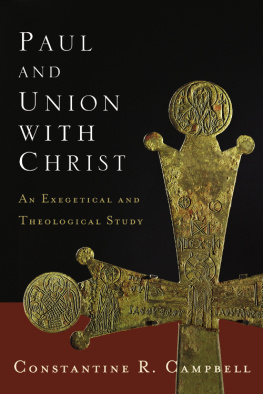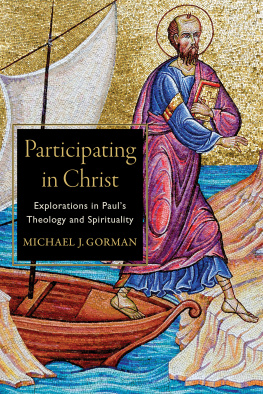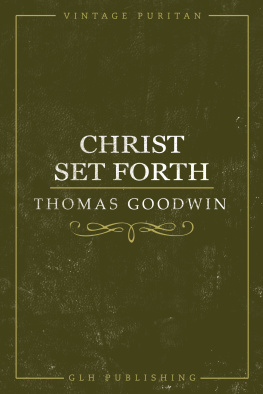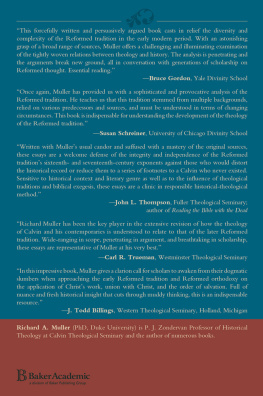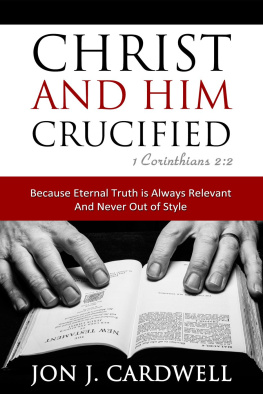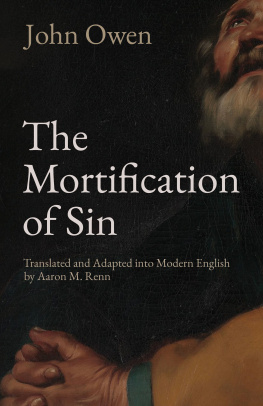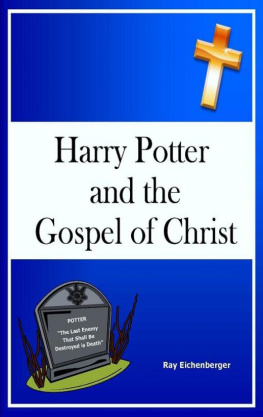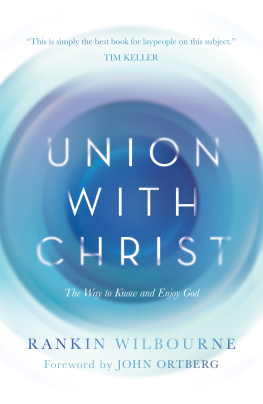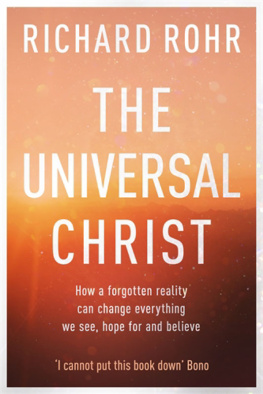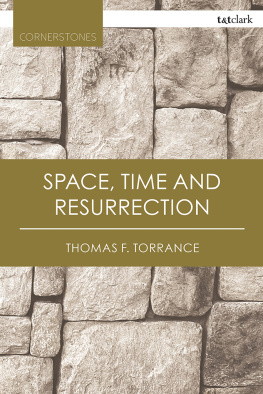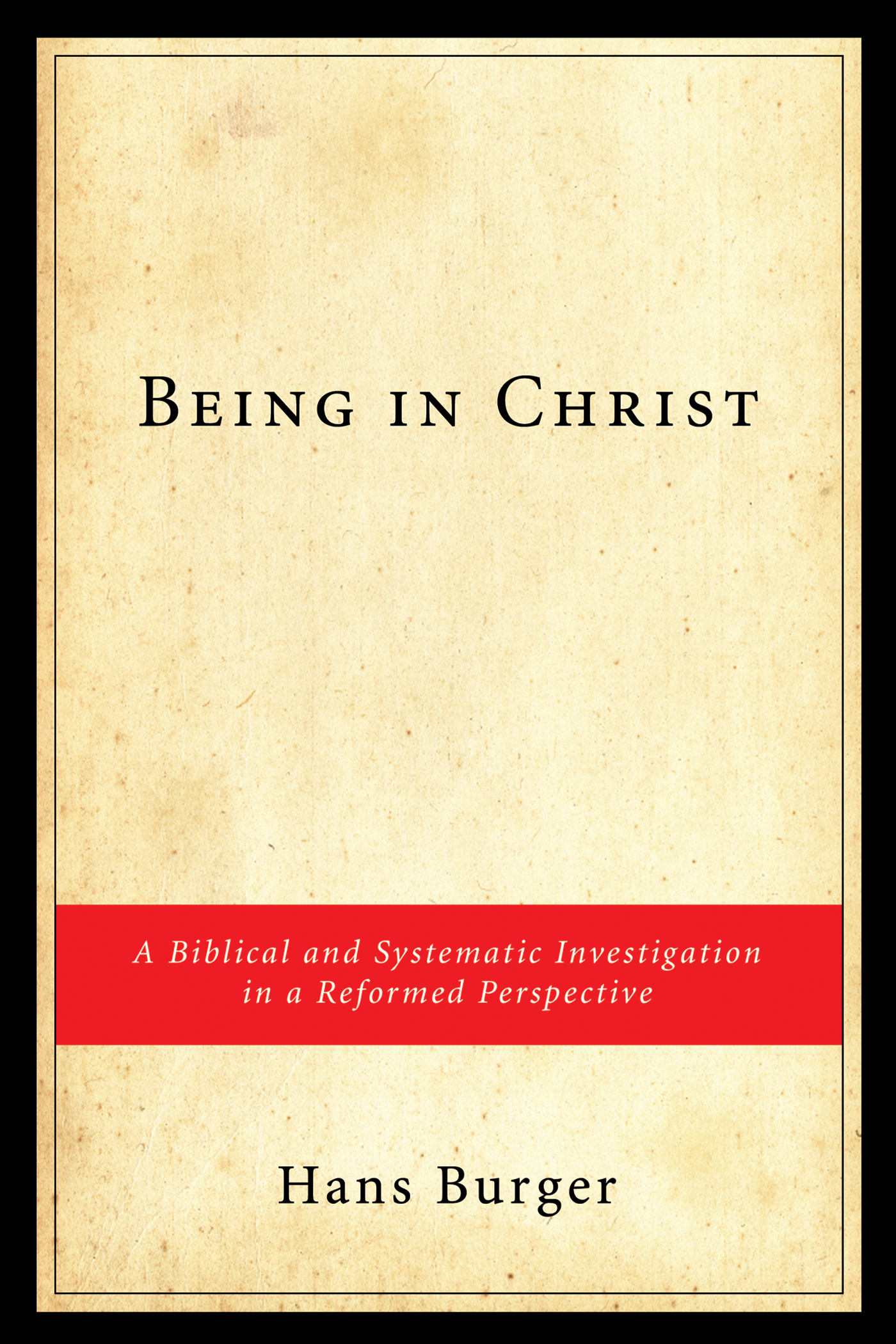Copyright 2009 Hans Burger. All rights reserved. Except for brief quotations in critical publications or reviews, no part of this book may be reproduced in any manner without prior written permission from the publisher. Write: Permissions, Wipf and Stock Publishers, W. th Ave., Suite , Eugene, OR 97401 .
W. th Ave., Suite
All scripture quotations, unless otherwise indicated, are taken from the HOLY BIBLE, NEW INTERNATIONAL VERSION. NIV. Copyright 1973, 1978, 1984 by International Bible Society. Used by permission of Zondervan. All rights reserved.
Manufactured in the U.S.A.
Foreword
At the moment that the work on my doctoral dissertation is coming to an end, I feel very grateful. I owe much to many people, but especially I want to express my gratitude towards God, Father, Son, and Spirit. Working on this study has enriched my life and my understanding of the gospel of Jesus Christat least in my own perspective. It is up to others now to judge whether my understanding of the gospel is right. Nevertheless, it is my prayer that this book may contribute to a deepening of the Christian life of othersa life in Christ.
Further, I want to thank prof. dr. Barend Kamphuis in the first place. I am very grateful for his willingness to be my supervisor. If he had seen nothing in my plans, I would have not been given a place as PhD student (AIO) at the Theological University in Kampen (Broederweg), the Netherlands. I appreciated the room he offered me to do theology in freedom. At the same time, he was present if needed, as a conversation partner or to ask critical questions. His knowledge of the Reformed tradition as well as his willingness to read my texts carefully were very helpful.
Secondly, prof. dr. I. U. Dalferth (Zrich) has to be mentioned. I wish to thank him for his time during our conversations in Zrich and in phone calls. He criticised the first version of my research plan, wanted to be my co-supervisor at a distance, and continued to encourage me with valuable suggestions. His methodological sharpness and his reactions on my texts improved the result significantly. Moreover, a word of thanks to prof. dr. Rob van Houwelingen. He supervised the New Testament-part of the project. I was often surprised by the quickness of his reactions on my texts, which were not hasty yet but always to the point.
Thanks are also due to the other members of the examining committee: prof. dr. Gerard den Hertog (TU Apeldoorn), prof. dr. Kees van der Kooi (VU Amsterdam), prof. dr. Kees de Ruijter (TU Kampen).
I could not have done this work in solitude. It has meant a lot to me that I could work in community with others. These were in the first place the other systematic theologians of Broederweg : dr. Ad de Bruijne downstairs, and my neighbours on the attic, dr. Hans Schaeffer and drs. Dolf te Velde. Together with the systematic theologians of the Theological University Apeldoornprof. dr. Gerard den Hertog, prof. dr. Hans Maris, and drs. Arnold Huijgenwe met monthly as a research group. It was always a joy to see each other and discuss a text of one of the members.
More PhD students populated the attic of Broederweg . I have good memories to our discussions and lunches. But the library of the Theological University should not be forgotten. Almost every book I needed was present in their collection, and their service was excellent.
Happily the theological world is bigger than Kampen. It was good to join other company regularly. I was accepted as a member of NOSTER, the Dutch Research School of Theology and Religious Studies; I could visit the annual XART-conferences; and have been part of the promovendi beraad of the Gereformeerde Bond. I have enjoyed all different meetings as well as the conversations with various theologians in the lobby. What also encouraged me were the meetings of the study group Christocentric Community. They remembered me always of the church I was working for.
That I could do my research, visit Zrich and work as a PhD student was made possible financially by different foundations and persons. I could study a semester in Zrich thanks to support of, among others, the Dr. Hendrik Mullers Vaderlandsch Fonds. And from the sponsors who enabled me to finish my project I want to mention the Jagtspoel-foundation and the Reformed Church of Hilversum (the Netherlands). The publication of my doctoral dissertation was made possible by a donation of the foundation Afbouw in Kampen.
In the final phase of the completion of my manuscript also different people played a role. I am delighted with the theological friendship of three of them, friends from the beginning of my theological study in 1992 up to this day: drs. Pieter Both, drs. Wim van der Schee and drs. Thijs Tromp. They read the entire manuscript and gave their comments.
I could not have missed Ed Pieffers (Kampen) as well as Andy Draycott (Edinburgh). They both checked over all of my English. If my style still needs improvement, it is not they who are to be blamed for it. I am very glad that they both took the time to read my texts and correct my English. Ria Kuijper-Versteeg (Franeker) helped me in the latest phase of making the manuscript ready for the publisher.
Some material in this book has been published before in Dutch. Sections ... and .. appeared in a slightly different version as Een eeuwigdurende verbondenheid. Bavincks concept van de unio mystica. In Ontmoetingen met Herman Bavinck , Barneveld: De Vuurbaak 2006 , . A small part of section .. appeared in Theologia crucis, theologia gloriae, of geen van beide? In: Levend water. Gereformeerd debat over charismatische vernieuwing . Barneveld: De Vuurbaak 2006 , . I would like to thank the publishers, De Vuurbaak Barneveld, for their permission to use this material.
I have finished this book in Franeker, where I have been working for two years as a minister in the Reformed Church De Voorhof. I feel privileged that I have worked in their midst. I hope that they may enjoy some fruits of the work that has gone into this book.
Life is more than theology and work. I am grateful to God for the parents He gave me and who were the first to teach me a Christian life; the first stones on which this study builds. Comparably, I am grateful to God for my sharpest critic, my colleague, the one who continues to remind me of the questions of daily (Christian) life, the mother of our children Christi and Boaz, my friend: my wife Janneke. It is great to share my life with you.
Franeker, August 2008
Hans Burger
Introduction
1.1 Necessity of Renewed Reflection on Being in Christ
.. Theological climate
T o be or not to bein Christthat is the question. To quote Christof Gestrich: Christian faith and being in Christ are one. More empirical research would be necessary to determine the extent to which Gestrich is right. Nevertheless, a tendency to neglect Christ is one that I recognise.
This neglect of Christ has its place in the post-Barthian context. The disappearance of the dominance of Karl Barths christocentric theology created space for new theological ideas and orientations. Different themes like immanence, pneumatology (or pneumatheology), reality, liberation, spirituality, mysticism, narrative, and biography received an important place on the theological agenda. Consequently, the significance of Jesus Christ is in danger of being reduced to a moral or spiritual example. In him we see how we should live with God and with each other. But Jesus Christ does not himself determine the relationship between God and the believer.


